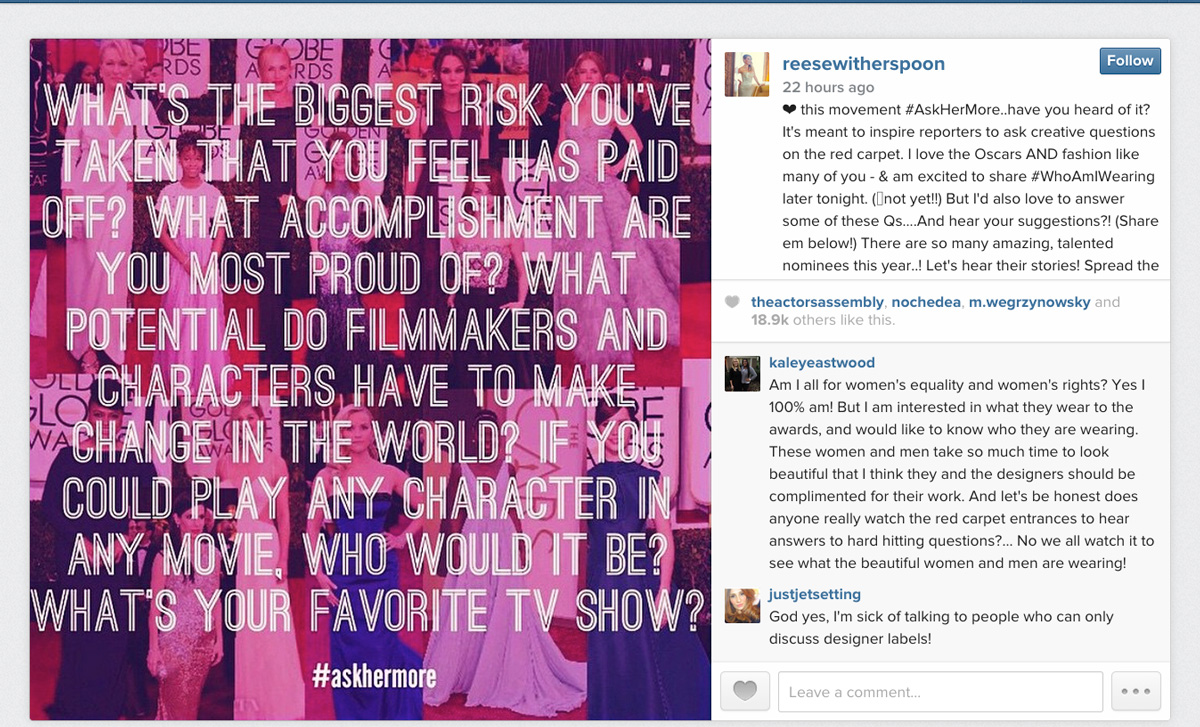The 2015 Oscar Winners Were All About Social Justice Movements
By:
On Sunday night, Hollywood's most impressive and well-dressed stars took to the Dolby Theater in Los Angeles, California to bestow upon one another a bevy of accolades and trophies. But even in the midst of all that glitz and glamour, several winners used their time in the spotlight to highlight injustice by advocating for causes near and dear to their hearts, proving that though the 2015 Academy Awards went long, there was no shortage of social justice in their messaging.

Heck, right out the gate actors and actresses were on-message, with women like Reese Witherspoon demanding that more thoughtful questions be equally as addressed to the female nominees rather than simply focusing on what they're wearing. The movement, represented in the hashtag #AskHerMore, highlights the hypocrisy of red carpets' very gendered — and sexist — line of questioning.
And that was only the first part: once Patricia Arquette stepped on stage to accept her award for portraying the under-appreciated mother in Richard Linklater's Boyhood, she managed to rouse every woman, and some men, in the place — including the indomitable Meryl Streep.
"To every woman who gave birth, to every taxpayer and citizen of this nation: we have fought for everybody else's equal rights," Arquette stated. "It's our time to have wage equality once and for all and equal rights for women in the United States of America." High-profile actresses like Streep and Jennifer Lopez were seen hooting and hollering in the audience.
Similarly, the response to Arquette's speech electrified social media in its wake. And her demands were warranted, as this Pew Research video proves: wage gap is no joke.
But Arquette was not alone in her compassion, nor was it just the women holding up the mantles of their causes: Birdman director Alejandro González Iñárritu spoke directly to his Mexican brethren during his win for Best Picture, both in his home country and stateside, calling for action and respect. "The ones who live in Mexico, I pray that we can find and build the government that we deserve," Iñárritu said. "The ones that live in this country, who are just part of the latest generation of immigrants in this county, I just pray they can be treated with the same dignity and respect as the ones who came before and built this incredible immigrant nation."
And then there was Graham Moore, the 34-year-old winner of the Best Adapted Screenplay Oscar for The Imitation Game — the tragic story of the man who ended World War II, Alan Turing — also took his time at the podium to speak to important matters.
"When I was 16 years old, I tried to kill myself," the writer confessed. "Because I felt weird and I felt different; I felt like I did not belong. And now I'm standing here. So I would like for this moment to be for that kid out there who feels like she's weird or she's different or she doesn't fit in anywhere. Yes you do — I promise you do. Stay weird, stay different. And then when it's your turn and you're standing on this stage, please pass that message to the next person."
But perhaps the most touching moment of the night came from musicians Common and John Legend, whose performance of the Oscar-winning song "Glory" from Selma brought more than a few tears to the audience — in particular David Oyelowo and Chris Pine. And their acceptance speech was no different.
"Selma is now because the struggle for justice is now," Legend said during the speech. "We know that the voting rights that they fought for 50 years ago is being compromised in this country today."
Perhaps even more startling to the overwhelmingly white audience was this mic-drop factual moment, when Legend reminded everyone that there are "more black men under correctional control today than were in slavery." And he wasn't lying.
So while it may be easy — if also accurate — to point out the frivolity of an awards show, it is a relief to see that some of the players involved still highlight the importance of issues beyond the odds of taking home a gold statue. It's a big stage, might as well share it with what matters, right?
